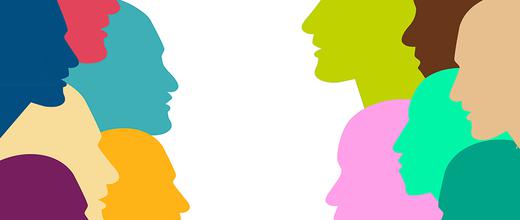The views expressed in our content reflect individual perspectives and do not represent the authoritative views of the Baha'i Faith.
Imagine a world where everyone agrees with one another and everyone has the same thoughts and perceptions on any topic … oh, how peaceful life would be. (Boring, too.)
Of course this is far from our reality. We all are unique, with different life experiences, different schooling, different cultures and nationalities, different tastes, likes and dislikes, different religions and of course different opinions on many subjects.
These differences can often be a major cause of interpersonal conflicts as well as global conflicts, so what is the solution? We will always be different from another—but does that mean we need to accept conflict as a part of life? Or simply stop having a dialogue to avoid conflict all together?
A few years after we had moved from Europe to the US, my husband and I were at a company dinner and we all started having conversations that began to get heated. A wife suddenly said to her husband: “What was our rule? No talking about religion and politics at the dinner table!” Everyone went silent, and we started talking about shallow topics again. “Great weather we’re having, don’t you think?”
That night it became obvious to me that silence or avoidance of topics that matter is definitely not the solution to coming to a conclusion, resolving conflicts or finding the truth.
According to the Baha’i writings Abdu’l-Baha advises:
We must take counsel together in such wise that no occasion for ill-feeling or discord may arise. This can be attained when every member expresseth with absolute freedom his own opinion and setteth forth his argument. Should anyone oppose, he must on no account feel hurt for not until matters are fully discussed can the right way be revealed. The shining spark of truth cometh forth only after the clash of differing opinions. – Selections from the Writings of Abdu’l-Baha, p. 87.
This surely is not an easy task and requires patience and practice.
I have to admit that I don’t shy away from stating my opinions—and I have some strong feelings on certain topics. Interestingly, social media has become a virtual community where I can practice accepting differing opinions without feeling hurt. I can also learn to formulate my opinions in a way not to hurt others who think differently.
Nevertheless, some do get hurt and often their reaction is to simply “unfriend” the one who expresses a different opinion. Now I consciously do not unfriend anyone who has different views on matters than me, and we do get into lengthy discussions. In retrospect, I realize how much I have learned from exactly those people who opposed my view. Instead of feeling oppositional, as I did at the beginning, I now feel enriched and have even shifted my thoughts and perceptions on some issues.
Alvin Toffler said: “The illiterate of the 21st century will not be those who cannot read and write, but those who cannot learn, unlearn, and relearn.”
To learn, unlearn and relearn we need to keep an open mind, and use the Baha’i skills of consultation as tools to arrive to the truth. Baha’is are encouraged to consult in all things. Baha’u’llah said: “The maturity of the gift of understanding is made manifest through consultation.” – quoted by the Universal House of Justice in The Promise of World Peace, p. 4. Baha’u’llah also wrote:
No man can attain his true station except through his justice. No power can exist except through unity. No welfare and no well-being can be attained except through consultation. – from a tablet to an individual Baha’i.
But there is an even more important factor to consider before we can arrive at true consultation:
… consultation must have for its object the investigation of truth. He who expresses an opinion should not voice it as correct and right but set it forth as a contribution to the consensus of opinion, for the light of reality becomes apparent when two opinions coincide. A spark is produced when flint and steel come together. Man should weigh his opinions with the utmost serenity, calmness and composure. Before expressing his own views he should carefully consider the views already advanced by others. If he finds that a previously expressed opinion is more true and worthy, he should accept it immediately and not willfully hold to an opinion of his own. By this excellent method he endeavors to arrive at unity and truth. Opposition and division are deplorable. It is better then to have the opinion of a wise, sagacious man; otherwise, contradiction and altercation, in which varied and divergent views are presented, will make it necessary for a judicial body to render decision upon the question. Even a majority opinion or consensus may be incorrect. A thousand people may hold to one view and be mistaken, whereas one sagacious person may be right. Therefore, true consultation is spiritual conference in the attitude and atmosphere of love. Members must love each other in the spirit of fellowship in order that good results may be forthcoming. Love and fellowship are the foundation. – Abdu’l-Baha, The Promulgation of Universal Peace, pp. 72-73.

















Comments
Sign in or create an account
Continue with Facebookor